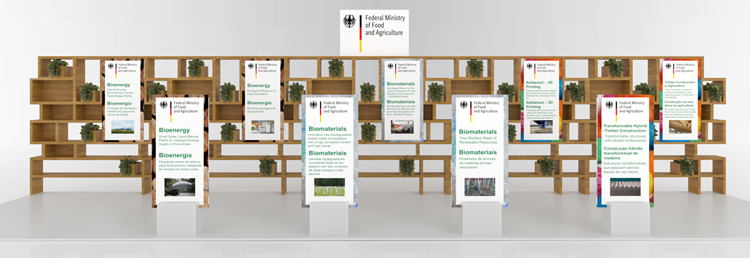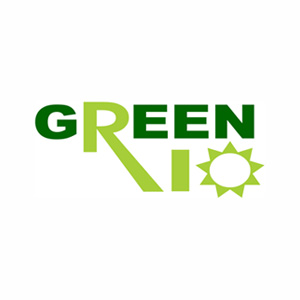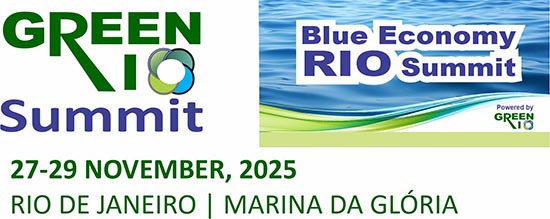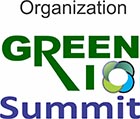| Green Rio 2021 discusses bioeconomy in Latin America and cooperatives in the Amazon |
Free hybrid event was held online and at Marina da Glória, Rio de Janeiro, between November 25th and 27th

An important event to consolidate Brazil as a strategic country in the global bioeconomy scenario, Green Rio returned in person to Marina da Glória, in Rio de Janeiro, between November 25th and 27th and was also broadcast online, enabling all interested parties follow the debates of the event. The public who visited the Green Rio 2021, in addition to meeting producers committed to healthy eating and sustainable development, had free access to the conferences with speakers from Brazil and other countries.
In its ninth edition, the event focused on two themes: the Bioeconomy in Latin America and the Amazon, with a focus mainly on socio-biodiversity cooperatives, which were present at the event with support from the MAPA-GIZ cooperation

For the fourth time, the German-Brazilian Bioeconomy Workshop was held during Green Rio.
BRAZILIAN-GERMAN BIOECONOMY WORKSHOP 2021 – WORKING TOGETHER FOR SUSTAINABLE BIOMASS USE


This year, the results of the joint call announced during the Green Rio Online 2020 were presented. The following projects were selected:
– Development of Amazonian biodyes from renewable resources for industrial coloring of biopolymers
– Microencapsulated hop extracts as food additives for sustainable poultry production
– Development of the macauba value chain for the global bioeconomy, based on the sustainable use of local biodiversity
– Native Brazilian plants as a source of innovative raw material for sustainable agricultural and cosmetic use, contributing to improved bioeconomy
These projects were presented during the Workshop by representatives of selected institutions.
The event also served as a stage for the launch of the SENAI CETIQT Bioeconomy portal, which aims to be a meeting point, dissemination and business realization in order to increase the bioeconomy in the country. According to data from SENAI, the bioeconomy could add up to U$ 53 billion to the GDP and 217,000 jobs in the next two decades.

“Green Rio has become relevant because it offers developments, it’s an event that doesn’t end on the third day. Discussions in search of solutions will continue, so that in the next edition we can present what has been done and propose new scenarios. In 2021 Latin America occupied more space, we discussed the bioeconomy and school feeding in Latin America. The hybrid format helped us, allowing several international representatives to participate in the event”, said Maria Beatriz Costa, coordinator of Green Rio.
Latin America and the Caribbean had relevant panels. On November 25, addressing Bioeconomy in this region (considered “Biodiversity Superpower” by UNEP) had the participation of FAO, government and businessmen. On the 26th, in partnership with FAO, the Integration of Traditional Food Systems in Latin America and School Feeding in Latin America were presented.

School feeding programs, which serve around 85 million students in Latin America and the Caribbean, were highlighted. According to the Food and Agriculture Organization of the United Nations (FAO), the region is the most expensive place to eat healthily – being an unattainable reality for 113 million people.
Lack of access to healthy diets and poor quality of food bring negative impacts and increase the likelihood of disability, increasing overweight and obesity, as well as chronic non-communicable diseases. According to the Ministry of Health, in Brazil, one in three children aged between 5 and 9 years are overweight.
For this reason, FAO was present at Green Rio and presented the project Consolidation of School Feeding Programs in Latin America and the Caribbean, an International Technical Cooperation initiative with the Brazilian government that works to strengthen school feeding policies in the region. In addition to improving the quality of food for children, it strengthens the local family farming chain, as it encourages countries to purchase food from small farmers through public purchases.
Among the speakers present at the event were the Secretary of Family Agriculture and Cooperatives of the Ministry of Agriculture, Livestock and Supply (Mapa), César Halum; National Secretary for Innovation at the Ministry of Agriculture, Fernando Camargo; Najla Veloso, coordinator of the Consolidation of School Feeding Programs in Latin America and the Caribbean project and Professor Benk Mikkelsen, from the University of Copenhagen.

Exhibitors
During the three days of Green Rio, the public had access to innovative solutions and product launches. The fair brought together more than 80 exhibitors, bringing articles for industries, consumers and farmers, always related to biodiversity, green economy and sustainable production.
SEBRAE/RJ was present at Green Rio through food and beverage, fashion and startups selected for the event. Participating biostartups develop sustainable solutions for agribusiness, food, beverage, cosmetics, fashion, energy and the environment. The Green Rio Innovation Award was presented for the first time, with support from Sebrae/RJ.

Sebrae/AM, on the other hand, brings nine entrepreneurs with products from the Amazon’s biodiversity.

Fiocruz opened space for planetary health and showed projects on medicinal and herbal plants with the participation of family farming. Finep, the public agency that finances innovation, also had its stand.

The Ministry of Agriculture of Brazil was also present. At the stand, cooperatives of small farmers producing products such as açaí pulp, essential oils, perfumes, powdered guaraná and frozen pirarucu were presented. Forest tourism and crafts are also part of the portfolio of cooperatives. In fact, Green Rio promoted a meeting of opportunities between agricultural cooperatives, industrial entrepreneurs and investors. The objective was to create possibilities for large players and micro producers to do business, without intermediaries, thus valuing the farmer’s work.

Partnership between Brazil, Denmark and China
After nearly a year of developing knowledge of Brazilian students about healthy and sustainable eating, food waste and the impact on the environment, the SELEA 21 program, a partnership between Denmark, China and Brazil, presented the results of the project Saturday at Green Rio, in the School Project SELEA 21 panel. The work was focused on cross-professional collaboration to achieve the goals of the Sustainable Development Goals (SDGs) linked to health and well-being, combating food waste and climate change.
Among the products developed by students aged 10 to 16, using technological tools, are an intelligent container that informs the shelf life of food according to the emission of gases and a robotic trash can that identifies the appropriate trash for the most varied types of garbage.
The leader of this project, Professor Benk Mikkelsen / University of Copenhagen, came to Green Rio to present the project and there were demonstrations of the robots developed by the students at the SELEA 21 stand.

German virtual booth at the Green Rio Online Platform
During the event, Green Rio launched the new platform Green Rio Online. A showcase is on air, with sections in Portuguese and English containing content and multimedia from more than 40 different companies and institutions from Green Rio.
In addition, it was possible to follow the transmission of the lectures with simultaneous translation through the platform, which access will also be free.

A highlight is the German Ministry of Agriculture, with a section containing nine research projects in bioeconomy, as well as a virtual booth to access information. All Green Rio content can be accessed from the website:
www.greenrioonline.com.br

About Green Rio
Green Rio had its first edition in 2012, when it was a side-event of Rio+20. Over these eight years, the event has established itself as a sustainable business platform that brings together exhibitors, speakers and representatives of the green economy and the organic sector.
November 25th, Thursday
10:00 – Opening
11:00 – Launching of SENAI Bioeconomy Platform
11:30 – Cooperativism and ESG Agenda
14:00 – Bioeconomy in Latin America and the Caribbean
15:00 – Bioeconomy, Innovation and Sustainable Production
16:00 – ESG and Internationalization
16h50 – Brazilian Bioinnovation Association (ABBI) Panel
November 26, Friday Morning
10 AM – 1h30 PM
BRAZILIAN-GERMAN BIOECONOMY WORKSHOP 2021 – WORKING TOGETHER FOR SUSTAINABLE BIOMASS USE
![]()

November 26, Friday Afternoon
14:10 – Bioeconomy / Amazon
15:10 – Organics and Carbon Panel
16:10 – Integration of Latin American Food Systems
27 de novembro – Saturday
10:00 – School Project SELEA 21
Dinamarca
Brazil
China
11:20 – Mesa Brasil, Mesa no Campo – SESC RJ
12h30 – Countdown Rio+30
14:00 – Biodiversity and Planetary Heatlh
14:50 – Bioeconomy / Regional Development
15:50 – Rio de Janeiro State: Agriculture, Entrepreneurship and Sustainable Development


